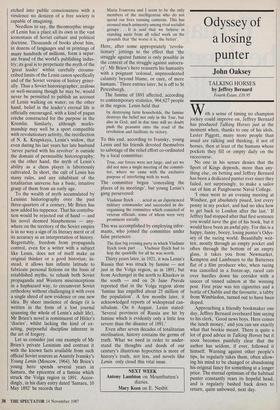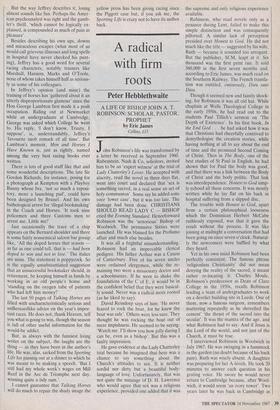Odyssey of a losing punter
John Oaksey
TALKING HORSES by Jeffrey Bernard
Fourth Estate, f10.95
With a sense of timing no champion jockey could improve on, Jeffrey Bernard has produced Talking Horses just at the moment when, thanks to one of his idols, Lester Piggott, many more people than usual are talking and thinking, if not of horses, then at least of the humans whose pockets they fill or empty daily on the racecourse.
No one in his senses denies that the Sport of Kings depends, more than any- thing else, on betting and Jeffrey Bernard has been a dedicated punter ever since they failed, not surprisingly, to make a sailor out of him at Pangbourne Naval College.
`I once went to an evening meeting at Windsor, got absolutely pissed, lost every penny in my pocket, and had no idea how to get back to London after the last.' If Jeffrey had stopped after that first sentence you would have the gist of his book, but it would have been an awful pity. For this is a happy, funny, boozy, losing punter's Odys- sey of the racing world. Beautifully writ- ten, mostly through an empty pocket and often through the bottom of an empty glass, it takes you from Newmarket, Kempton and Lambourn to the Battersea flat of a film producer who, when racing was cancelled in a freeze-up, raced cats over hurdles down his corridor with a saucer of tinned salmon at the winning post. First prize was ten cigarettes and a bottle of Chablis and the favourite, a tabby from Wimbledon, turned out to have been doped.
Approaching a friendly bookmaker one day, Jeffrey Bernard overheard him saying to his clerk, 'Good news boys. Here comes the lunch money,' and you can see exactly what that bookie meant. There is quite a lot of good advice in Talking Horses but it soon becomes painfully clear that the author has seldom, if ever, followed it himself. Warning against other people's tips, he regularly takes them, often allow- ing his mind to be changed or abandoning his original fancy for something at a longer price. The eternal optimism of the habitual punter constantly rears its hopeful head, and is regularly bashed back down to return, quite unbowed, next day. But the way Jeffrey describes it, losing almost sounds like fun. Perhaps the Amer- ican psychoanalyst was right and the gamb- ler's thrill, 'which cannot be logically ex- plained, is compounded as much of pain as pleasure'.
Besides describing his own ups, downs and miraculous escapes (what most of us would call grievous illnesses and long spells in hospital have never checked his punt- ing), Jeffrey has a good word for several racing characters, notably trainers like Marshall, Hannon, Marks and O'Toole, none of whom takes himself half as serious- ly as some of his colleagues.
In Jeffrey's opinion .(and mine) the training of horses has 'gathered about it an utterly disproportionate glamour' since the Hon George Lambton first made it a posh occupation. Riding out at Newmarket while an undergraduate at Cambridge, George was asked which College he went to. His reply, 'I don't know, Trinity, I suppose', is, understandably, Jeffrey's `favourite snob remark of all time'. But Lambton's memoir, Men and Horses 1 Have Known is, just as rightly, named among the very best racing books ever written.
There is lots of good stuff like that and some wonderful descriptions. The late Sir Gordon Richards, for instance, posing for a photograph at Kempton with a Playboy Bunny whose bra, 'not so much a reposi- tory, more a launching pad', could have been designed by Brunel. And his own bathological arrest for 'illegal bookmaking' in the Coach and Horses. 'It took nine policemen and three Customs men to arrest me. Little me!'
Just occasionally the trace of a chip appears on the Bernard shoulder and there is some fairly nonsensical saloon bar gossip like, 'All the doped horses that season as far as one could tell, that is — had been doped to win and not to lose.' The italics are mine. The statement is poppycock. So is the equally unsubstantiated suggestion that an unsuccessful bookmaker should, in retirement, be keeping himself in funds by working in an old people's home and `standing on the oxygen tube of patients who had left him money!'
The last 50 pages of Talking Horses are filled with uncharacteristically serious and unBernardlike advice on the year's impor- tant races. He does not, thank Heaven, tell you what is going to win, though the season is full of other useful information for the would-be addict.
But, as always with the funniest living writer on the subject, the laughs are the thing — as they have been in the author's life. He was, alas, sacked from the Sporting Life for passing out at a dinner to which he was meant to be making a speech. 'But I still had my whole week's wages on Mill Reef in the Arc de Triomphe next day, winning quite a tidy sum.'
I cannot guarantee that Talking Horses will do much to repair the shady image the yellow press has been giving racing since the Piggott case but, if you ask me, the Sporting Life is crazy not to have its author back.











































































 Previous page
Previous page